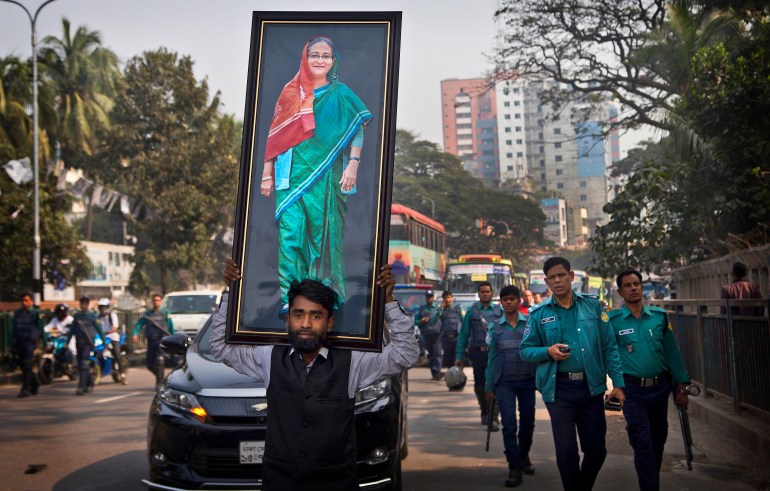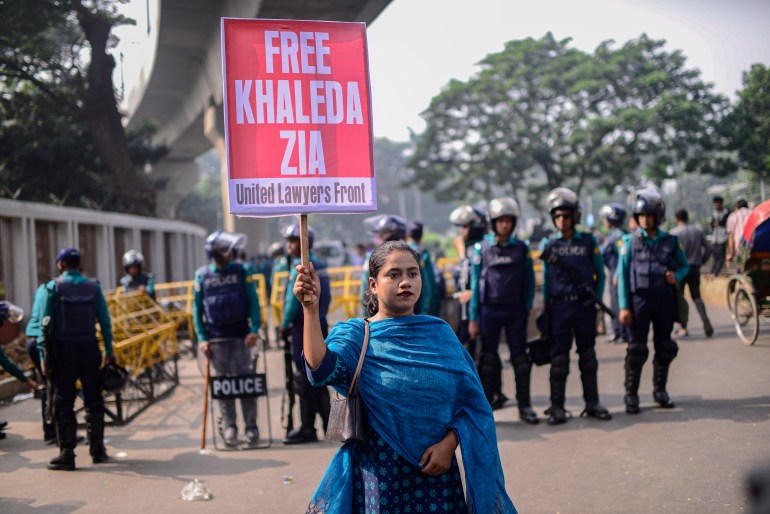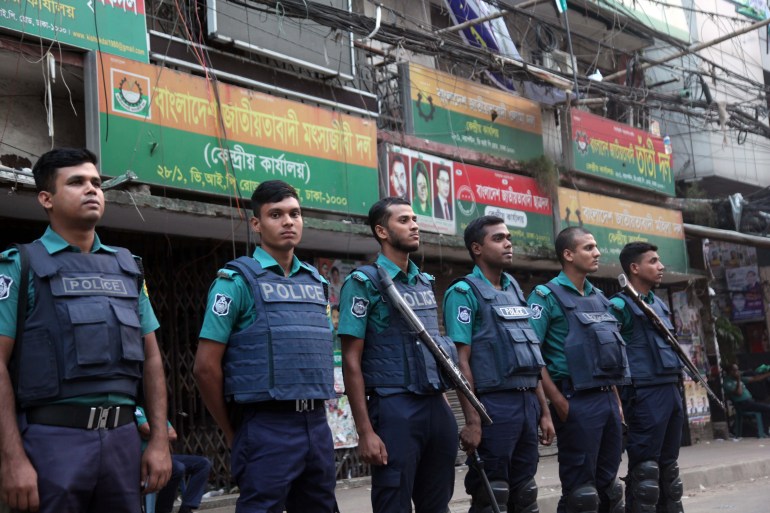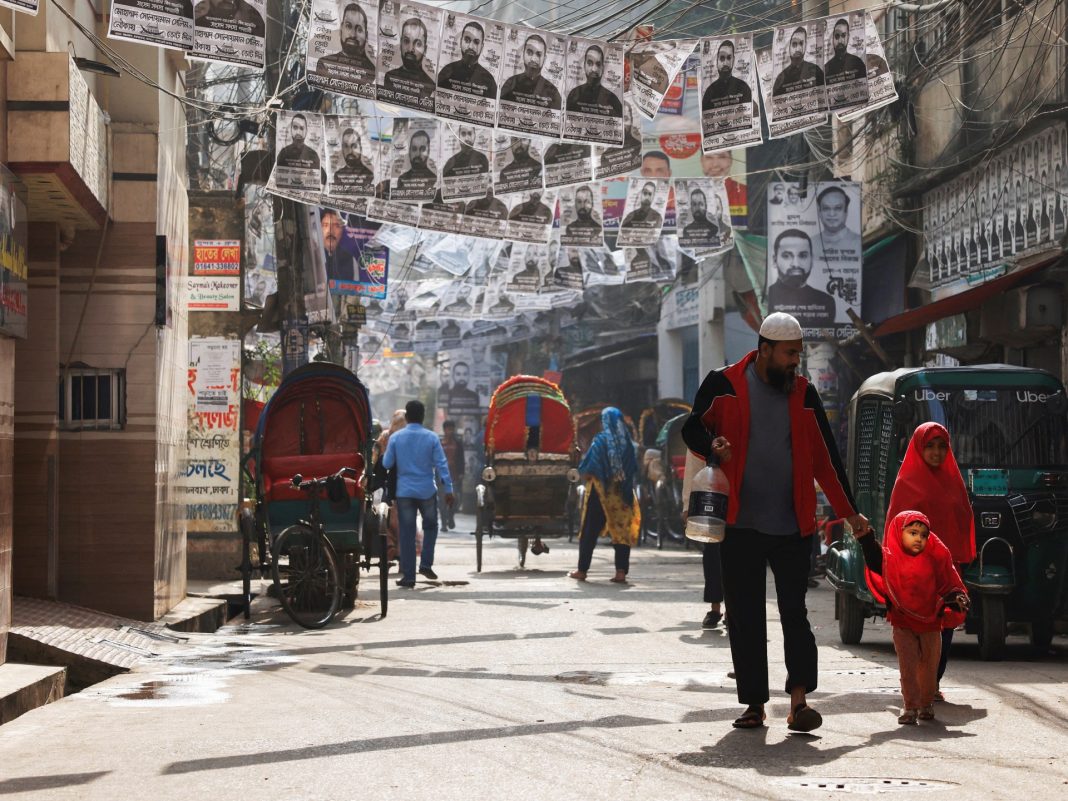Dhaka, Bangladesh – Hasanul Islam Ador, an elected representative in a rural area in southern Bangladesh’s Cox’s Bazar district, was taken aback when a group of officials in plain clothes barged into his home last week and issued threats ordering him to stop campaigning for an independent candidate for the national election to be held on Sunday.
Ador was on a campaign trail for Zafar Ahmed, the current member of parliament from the district representing the ruling Awami League (AL) party.
When Ahmed failed to secure his party’s nomination this year, he was asked by his party’s leadership to run as an independent contender – one of what analysts and critics say are hundreds of so-called “dummy” candidates put up by Prime Minister Sheikh Hasina’s party to make the election look free and fair.
Hasina, 76, has been in power for 15 straight years – the longest-serving leader in Bangladesh’s history.

Her tenure has been marked by allegations of authoritarian rule, targeting of the opposition, the suppression of people’s rights, and large-scale vote rigging in elections held to keep her in power.
As she seeks a record fourth term in Sunday’s vote, the main opposition Bangladesh Nationalist Party (BNP), led by ailing former Prime Minister Khaleda Zia, has decided to boycott the vote, as it did in 2014.
Zia, 78, was jailed for more than two years over corruption charges and was moved to house arrest over health concerns in 2020. She denies the allegation, saying her conviction was politically motivated.

The BNP says it does not have any confidence in Hasina presiding over a free and fair election. It demanded Hasina step down to make way for a caretaker government to organise the vote.
But the demand was met with a severe government crackdown, which saw tens of thousands of BNP members arrested and at least 11 of them killed by security forces during street protests, raising concerns over valid elections in the garments hub of the world.
In September, the United States, the top buyer of Bangladeshi garments, said it was imposing a visa ban on the country’s officials who undermine the democratic election process.
Two months later, Human Rights Watch condemned the arrests of opposition members and said “the government’s autocratic crackdown will jeopardise future economic cooperation” with other countries.
‘Mockery of our democracy’
Since the opposition’s boycott call, Hasina’s party had been scrambling to field independent – or “dummy” – candidates to make the election look fair.
The “competitive make-up”, as analysts call the move, saw the Awami League fielding candidates like Ahmed in the fray, but at the same time, ensuring the ballot does not throw up any surprises for the party.
To ensure the results are in favour of the ruling party, the government is allegedly using law enforcement machinery and intelligence agencies to intimidate and threaten independent candidates.
“The people who barged into my home were from an intelligence agency,” Ador told Al Jazeera. “They came to my house and threatened me to stop campaigning for Ahmed and seek votes for a particular candidate.”

Ador and more than a dozen other local representatives in Ahmed’s constituency wrote a letter to the Bangladesh Election Commission, saying “an intelligence agency had put immense pressure and threatened them” to work for an Awami League candidate.
The commission acknowledged receiving such a letter to Al Jazeera, with election officials saying they were “seriously looking into the complaint”.
Without the main political opposition contesting, there is little uncertainty as to what the results of the Sunday vote will be.
“This election is a charade,” prominent Bangladeshi rights activist Shahidul Alam told Al Jazeera. “It’s a mockery of our democracy – whatever is left of it.”
The BNP has not only boycotted the election but has also announced a non-cooperation movement, asking people not to vote on Sunday.
As a result, the ruling Awami League’s main concern at the moment is to ensure a “reasonable” voter turnout, according to its official Bahauddin Nasim. To do that, the party has allegedly resorted to “undue” measures.
In many constituencies, members of the ruling party have been accused of threatening to strip people of the government’s social benefits schemes if they fail to appear in polling booths on election day.
Nearly 13 million people, belonging to the most vulnerable groups, receive direct social benefits from the government, according to the finance ministry’s data. Moreover, getting on the government list of beneficiaries is a process involving 473 elected officials, nearly all of them belonging to the Awami League.
Videos, unverified by Al Jazeera, are viral on Bangladeshi social media, purportedly showing ruling party officials threatening the voters.

Rumeen Farhana, the BNP’s international affairs secretary, told Al Jazeera that participating in an election, knowing it will be rigged, was “suicidal and a betrayal to the thousands who were hurt, detained, tortured, or killed for democracy and free speech”.
“People of this country will remember this election as the most absurd and illegitimate one in its history,” she said.
‘Strategy of the autocrats’
Michael Kugelman, director of the South Asia Institute at the Wilson Center in the United States, said the BNP boycott does the Awami League a “big favour by making it harder for Western countries to conclude that the election is fraudulent”.
“If the Awami League wins 95 percent of the vote, one can’t accuse the party of stealing votes because it will essentially be running against itself,” Kugelman told Al Jazeera.
He said the pattern of events leading to the BNP’s decision to boycott should be of concern to the West.
“Arrests, jailings, a broader crackdown on dissent, and especially the Awami League’s refusal to release top BNP leaders from jail as the election drew closer – all of this will shape the thinking of Washington and other capitals post-election,” he said.
Mohammad A Arafat, Awami League candidate from capital Dhaka, said he was “baffled by the notion that the winner of this election will not get legitimacy from the Western countries”.
“We did whatever we could. We strengthened our Election Commission and created a level playing field for all political parties. If BNP didn’t want to join, it’s their choice. Many parties have taken part in the election,” he told Al Jazeera.
Ali Riaz, distinguished professor of politics and government at the Illinois State University in the US, thinks the BNP’s absence from the vote was always the most preferred option for the Awami League.
“Forcing the main opposition out of the election process is a strategy autocrats around the world tend to prefer,” he told Al Jazeera.
Riaz said the upcoming vote on Sunday does not meet the “basic standard of an election”.
“The entire exercise looks like a stage-managed show to provide a veneer of legal legitimacy which is otherwise just dividing the parliamentary seats among allies,” he said. “I don’t think the winner will gain legitimacy from the Western countries.”
Kugelman, however, said he did not expect the Western capitals to cut ties with Dhaka.
“That would be rash, not to mention imprudent, especially given the close commercial ties they have with Bangladesh and the perceived strategic importance of Bangladesh in the context of the power competition in the Indo-Pacific,” he said.
“But I do think if Washington and other Western capitals conclude the election isn’t credible – and it’s hard to assess it as credible when the main opposition party sits it out – there is a chance that they could review future relations with Dhaka, with downgrading of ties a possibility.”







